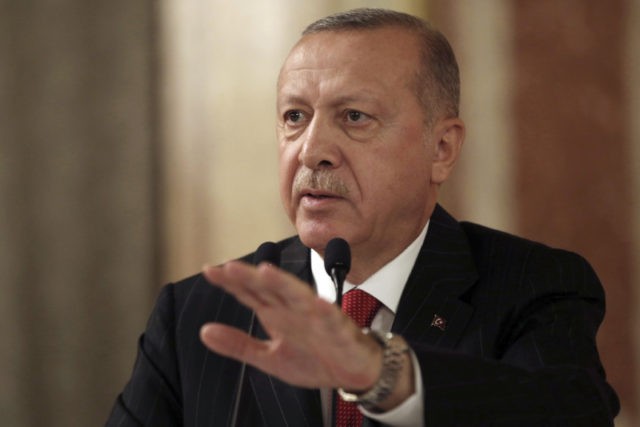Iraqi intelligence officials told UAE’s the National on Wednesday that slain Islamic State leader Abu Bakr al-Baghdadi used his brother Juma to carry messages into Turkey on several occasions, concluding with a visit to Istanbul in April.
These trips were allegedly part of a courier network Baghdadi employed to monitor and manage ISIS while in hiding.
The National’s Iraqi sources were frustratingly short on details, including any background on Juma beyond the belief that he is one of Baghdadi’s three brothers. The sources were not certain if Juma is still alive, or if he has been captured. According to the report:
Little is known about Juma. No picture of him is publicly available nor are details of his appearance, age, current whereabouts and even his last name. As efforts to track his movements continue, much of the information about him remains classified. US special forces captured two men in the Barisha raid on Al Baghdadi’s compound, but it is unclear if Juma was one of them, or if he was present at the safe house at the time of the mission. The Iraqi officials said they do not have clear identification of who was killed or knowledge of who was captured in the raid, which was carried out by Delta Force commandos.
The brother, a member of the same pious Sunni Muslim family from the Iraq city of Samarra that sits on the east bank of the Tigris, practised an ultra-conservative version of Islam rooted in ISIS’s ideology even before Baghdadi, Abu Ahmad, a former associate of the notorious ISIS leader, said in 2015. At one point, he is believed to have become Baghdadi’s bodyguard and was the closest to him out of the three brothers. But the account of the officials reveals that, at least in recent months, he served instead as a conveyor of Baghdadi’s orders to key ISIS figures in Turkey and Iraq.
Examining the parcels Juma carried allegedly revealed that Baghdadi was still active in managing the broken Islamic State. He was receiving updates on “the state of their forces, money, logistics, and routes” from ISIS commanders in Iraq and was sending messages to “the ISIS guys inside Turkey,” as the National’s sources put it.
One interesting aspect of the story is that Juma’s activities were apparently an early clue that Baghdadi was hiding in Idlib, near Turkey, instead of Deir Ezzor, where ISIS remnants had more of a presence. This leads to uncomfortable questions of how Baghdadi’s brother, an active member of the Islamic State, was able to get in and out of Turkey so easily, and how he was able to cross territory controlled at the time by the Kurdish-led Syrian Democratic Forces (SDF).
The National editorially mentioned longstanding accusations of a “passive attitude in the Turkish security apparatus toward ISIS,” but some of the intelligence people it interviewed were much more blunt, including one former Turkish official:
“It is impossible for the Turkish intelligence that Turkey does not know of his presence five to seven kilometres away from the Turkish border,” a former high-ranking Turkish military officer said. Turkey on Tuesday said it had captured Al Baghdadi’s 65-year-old sister, Rasmiya Awad, near the Syrian town of Azaz. But former officials said she likely had little to do with the group’s operations and it was an attempt by Ankara to appear to be working against the group in the face of criticism.
“For the Turkish National Intelligence, or Turkish police, [ISIS] are not the real enemy,” said Ahmet Yayla, a former Turkish counter-terrorism police chief and now a fellow at the George Washington University Programme on Extremism. “They do not seriously look for these people, but [President Recep Tayyip] Erdogan is in a position where he is trying to prove that he is fighting against ISIS.
“That is the reason they are bragging about his sister who is 65 and most probably doesn’t have much to do with the issues there or what he is doing, but they are making a huge propaganda of it in the Turkish media.”
Turkish President Recep Tayyip Erdogan, perhaps stung by criticism that he was ostentatiously displaying Baghdadi’s sister like a trophy, announced the capture of another family member on Wednesday by saying, “We caught his wife, but we didn’t make a fuss about it.” Baghdadi reputedly had three more wives if Erdogan wants to complete his collection.
Some of the National’s sources discussed theories that Baghdadi was in Idlib at the time of his death because he was trying to move his entire family into Turkey, and more specifically Istanbul, where they could blend in with the large refugee population and plenty of foreign visitors.
The ease of traveling through Turkey has been a point of contention since the early days of the Islamic State and its enthusiastic recruitment of foreign fighters. The former Turkish general who spoke to the National compared Turkey’s porous borders to a colander of the sort used to drain water after cooking pasta.
According to the Iraqis, tracking Juma and exposing part of Baghdadi’s courier network did not directly lead to the raid that killed the ISIS leader, although both Iraqi and U.S. intelligence analysts were hoping it would do exactly that. One of the problems with targeting Baghdadi was that Juma’s trail seemed to go cold every time he got near Idlib province, so those hunting Baghdadi could never map out the last few miles that would have pointed to his precise location.

COMMENTS
Please let us know if you're having issues with commenting.